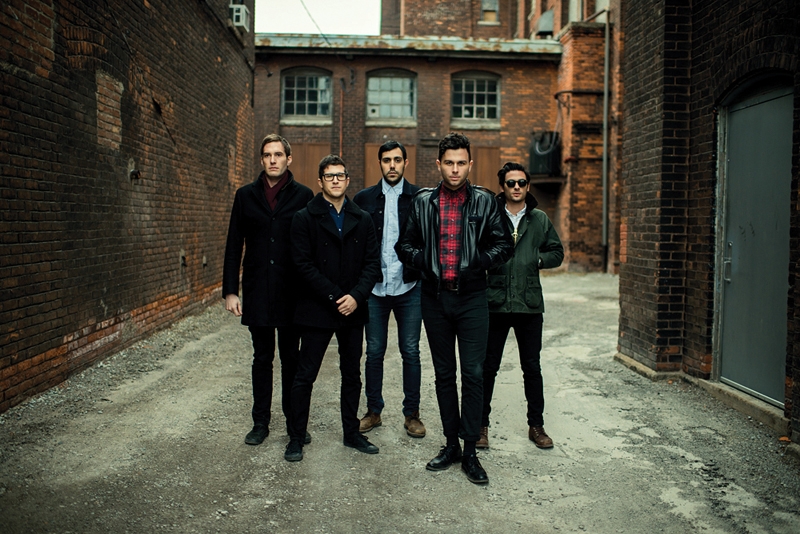High Noon
Arkells
Here we have the best album our Hamilton homeboys have made so far: a raucous, 80’s-infused blast of music that’s full of the Springsteen-esque joy and sentimentality which made their sound so appealing in the first place.
The music takes on a bittersweet tone in this album, but the energy is ever-present, along with simple lyrics that seem to rely on hooks a lot more than they used to, not that it’s a bad thing.
This is my quintessential summer album, the kind which works perfectly blared on a daytime drive or adds a bit of melancholy to nighttime cruising. Not bad for some Steeltown saps.
– Abdul Malik
Photo courtesy of Lana Del Ray Facebook.
Ultraviolence
Lana Del Ray
I can’t say I love Lana Del Rey. She feels like a product, a facsimile of what she’s trying to represent, a patchwork creature made in an executive’s lab: “You know what the kids will love? A criticism of sexual excess made in our multimillion dollar studios! Mua ha ha!”
You get what I’m saying.
That said, Ultraviolence might be the closest she’s gotten to sounding genuine, and beyond that, you can’t deny she’s just a lot of fun, in a weird sort of way.
Songs like “West Coast” and “Fucked My Way to the Top” give off a battered sexual energy, and her sultry voice takes what would be melodrama and gives it power.
The entire album is a dirty gem, one that will leave you listening with an evil, this-is-some-great-shit-grin.
– Abdul Malik
Photo courtesy of Shervin-Lainez
Familiars
The Antlers
It’s a shame The Antlers’ least depressing album is also easily their worst. I’m not of the opinion that artists need to be miserable to create art, but in the case of The Antlers, it may be true.
Songs like “Hotel” feel like a musical evolution, but the rest of the album seems to lack any inspiration, or anything interesting at all.
It’s a shame because The Antlers have always been one of the more interesting bands around. Maybe there will be newfound sorrow for their next project, but it’s not hard to give this one a pass.
– Abdul Malik
Photo courtesy of Ludovic Etienne.
In Conflict
Owen Pallett
Owen Pallett’s least pretentious album is his most engaging, his most interesting, and one of this year’s best.
With musical improvement all around and a newfound sense of poignant poetry, this is one of the most evocative albums I’ve ever heard, and not once does it seem like he’s trying.
It’s musical expression in its simplest, purest form, and it doesn’t attempt to be a concept album (which was the key misfire in Pallett’s career up until now). It just tries to be a good album.
And goddamn, does it succeed.
– Abdul Malik
Photo courtesy of Spoon Facebook.
They Want My Soul
Spoon
The Texan indie group’s eighth studio album proves to be their greatest—a refinement and renovation of the raw, bluesy art rock they’ve helped pioneer over the last two decades.
Never before have their guitar tracks thumped with such effortless momentum, or their drums pounded with such gravity.
The music chart natural paths, just listen to opener “Rent I Pay” or the clangy swagger of mid-album track “Knock Knock Knock.”
Likewise, frontman Britt Daniel, who’s always sounded like a slurred, drawling John Lennon, reaches new heights of both sensitivity and abrasiveness. In the sensational hook for “Do You,” the singer discovers sounds with his grainy vocal chords and sets them free.
They Want My Soul sees the band explore a few dream pop reverbs: “Inside Out” unexpectedly equates them to a Washed Out or Tame Impala.
Such experimentation is welcome, however, as it helps define the intrinsic qualities which separate these boys from the pack, just as soundalikes (read: The Arctic Monkeys) threatened to drown them out.
– Dustin Dyer
Photo courtesy of Columbia/Sony Music.
Wish I was Here: Original Soundtrack
Various Artists
I have yet to see Zach Braff’s sophomore effort as a writer-director-star. And in fact, I don’t really have any interest in doing so. This soundtrack reaffirms my assumptions of the movie itself: Wish I Was Here appears so false, such a blatant attempt at recreating the indie hipness of Garden State rather than exploring something which Braff cares about now.
The album opener, “So Now What” by The Shins, is just that: a grating sum of various techniques used on indie songs a decade ago—a trick bands have since had to move past, because they’re not novel anymore. But worse still, The Shins aren’t using their echoed strings and blooming falsetto as attempts to pad a melody (a melody, say, as beautiful as “New Slang,” used on the Garden State soundtrack). They’re using it in place of a melody.
The WIWH soundtrack is a list of hipster-cred artists piling on vague ideas of why they think they became famous. Sometimes their guesses are just wrong: Bon Iver’s Justin Vernon skips the melancholy notes of his better work, the stuff that really gets to you, going for an upswinging tune.
That said, his “Heavenly Father” feels like the one (new) song on the album in which the artist at least experimented, instead of playing strictly to the oh-so-whimsical pastel colours of the movie’s poster.
– Dustin Dyer
Arkells photo courtesy of Wikimedia Commons/Brookd Reynolds







